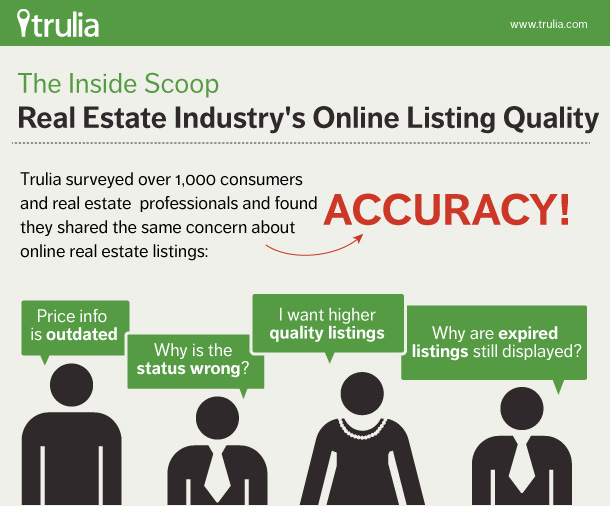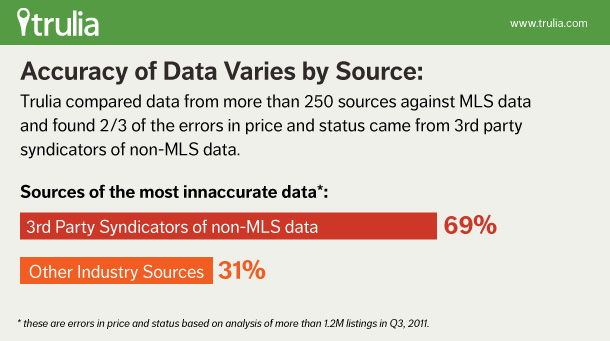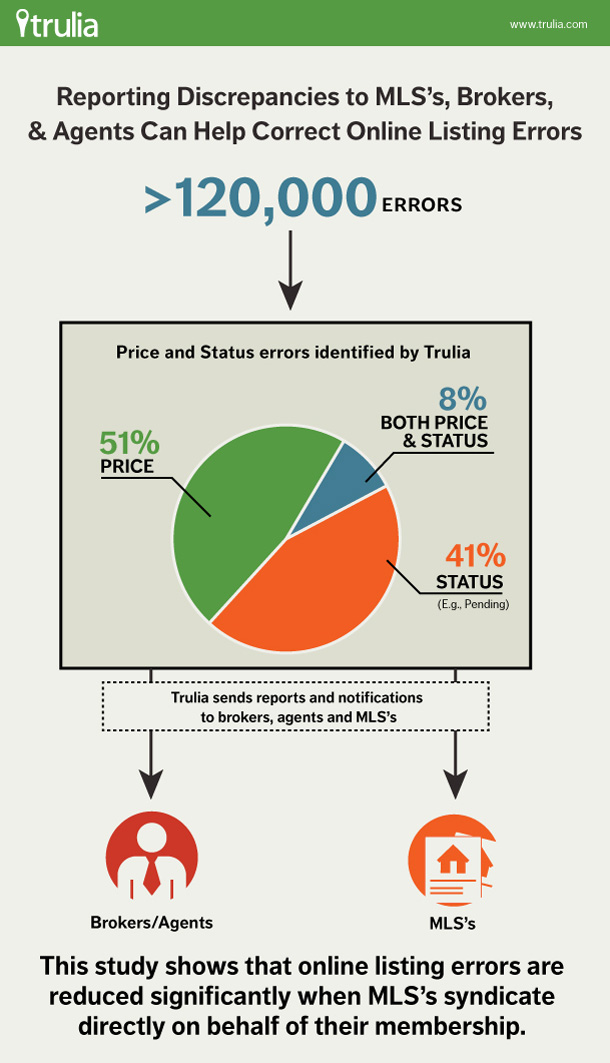A question to all you house hunters out there – have you ever found your dream home through an online search, only to later discover that it’s no longer for sale or that the price has changed? Well, you’re not alone. This is actually a very common, industry-wide problem. But rest assured – Trulia has taken the first steps to help fix what’s been broken by (1) doing regular “checkups” to see how much bad data is out there and then by (2) prescribing a treatment plan. While you can read more about that whole effort here, we thought it would be fun to share some of the insights that we found after accessing all the real estate data that’s online right now.
Two Wrongs Don’t Make A Right
When we asked more than 1,000 homebuyers, sellers and real estate pros on Trulia.com what their biggest headache was when it came to online house hunting, an overwhelming number said it was making sure the details on the homes for sale were right. Hands down, nothing can be more frustrating than falling in love with a home only to later find out that it’s completely out of reach. Given this, it’s not surprising that price and status (e.g., pending sale, sold and for sale) were listed as the biggest gripes.

The Usual Suspect: Third-Party Syndicators
So what gives – what’s with all this bad real estate data? Well, let’s take a step back and look at how most homes for sale are posted online. As a first step, home sellers will hire an agent or broker to add their home to the official “homes for sale” list that only real estate pros have access to (this would be the Multiple Listing Services, or MLSs, for those of you in the know). Depending on the MLS, the listed homes will then be posted online to real estate listing websites like Trulia. In other cases, real estate pros will manually post the homes that they’re trying to sell onto these websites OR they will use third-party syndicators (online services that will automatically make these updates on a number of websites all at once) to do the work for them.
In a perfect world, any and all changes to the price or status of a home for sale will be quickly updated by the agent or broker where ever they have posted it online. Unfortunately, this doesn’t always happen. When we analyzed all of these methods, we found that the source of all the bad real estate data floating around on the Internet is the result of sheer forgetfulness. In fact, more than two-thirds (69%) of all the errors that we found came from third-party syndicators. So just like a game of telephone, some details get lost.

Breaking Bad Data
To figure out how bad is bad when it comes to real estate data, we looked at 1.2 million homes for sale that can be found online on one of 250 real estate sites and compared them with what’s listed on the MLSs.
The verdict? We hate to say it, but this is bad news bears, my friend. The deets on 1 out of every 10 homes for sale (that’s roughly 120K errors – ugh) that you can find info for online is wrong! Yikes, that’s not good especially when you look at the breakdown. About half (51%) of the errors were related to price while the other half (41%) were wrong statuses. Even worse, a small fraction (8%) was caused by a double jeopardy of both price and status errors.
Call us crazy, but we’re pretty sure most house hunters look at more than 10 homes when they’re searching for a new house. Needless to say, this is definitely a problem – but what can we do about it? Well, as they say in AA, recognizing that you have a problem is the first step towards recovery. Now that we’ve exposed what’s happening and have shed some light onto the root of the problem, Trulia is taking the bull by the horns because enough is enough. To help make sure prices are up to date and statuses are correct, we’re taking leadership steps to (1) tag and ID bad real estate data, (2) correct anything that’s wrong on Trulia and (3) tell real estate pros when there is something off kilter with the online info about the homes they’re selling, allowing them to fix things ASAP. If you ask us, this is all part of a giant leap towards making housing hunting a little less frustrating for everyone.

(To download a PDF copy of this report, click here.)

